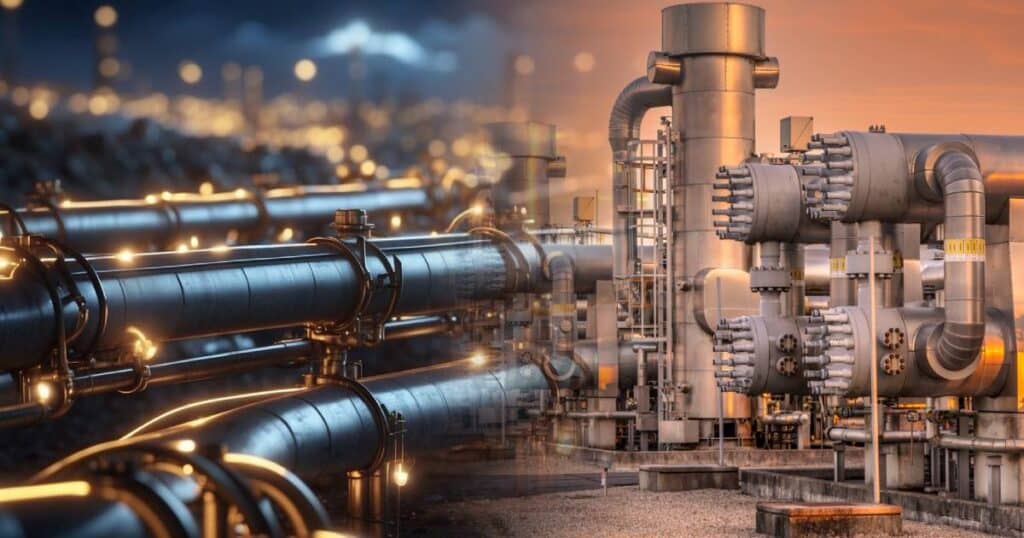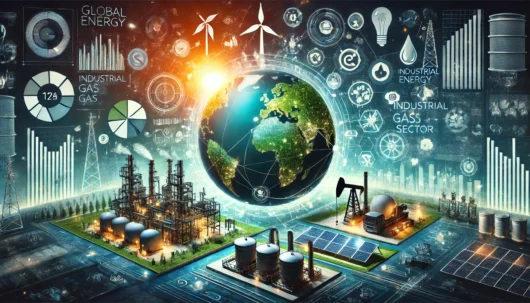Efficiency in the gas supply chain is essential for the industry and the consumers who rely on a steady and affordable energy flow. As a stakeholder in this sector, your understanding of the various dynamics that drive gas supply and consumption could substantially impact your approach to achieving cost savings without compromising on quality. It is crucial to recognise the significant factors, such as market demand, production costs, and distribution infrastructure, that all play a role in determining the price of gas.
Your ability to apply effective strategies for cost efficiency in the gas supply can set the foundation for a more sustainable energy framework. The myriad methods range from optimising procurement processes to investing in technology improvements that reduce energy consumption during gas compression and distribution. As a provider or consumer in the gas utility market, exploring and adopting such strategies to ensure a balance between cost and quality, securing economic benefits and long-term reliability, is within your interest.
Key Takeaways
- Understanding gas supply dynamics enhances cost-saving opportunities.
- Implementing strategic efficiencies optimises the overall gas supply.
- Balancing cost and quality in gas supply assures long-term sustainability.
Understanding the Dynamics of Gas Supply and Consumption

In examining the gas supply landscape, you’ll gain insight into the delicate balance between economics, regulatory frameworks, and the pursuit of energy efficiency. Discover how global trends and technological advancements usher in changes that resonate through the supply chain, affect sustainability efforts, and shape pricing structures.
Economics of Gas Supply and Natural Gas Prices
Natural gas prices are closely tied to supply and demand dynamics, storage levels, and production costs. The energy industry navigates these factors to maintain cost-effective operations. Notably, OPEC’s decisions can sway oil prices, which often correlate with natural gas prices.
Government Regulations and Policymaker Roles
Your understanding of government influence reveals that policymakers set taxes and incentives shaping the natural gas industry. These regulations can foster energy efficiency and sustainability or create hurdles affecting operating costs.
Energy Efficiency in Gas Utilization
Improving energy efficiency in consumption leads to significant savings. The industrial energy efficiency measures you implement can directly reduce energy prices and improve effectiveness, highlighting the importance of consumption practices.
Global Trends Affecting Gas Supply Efficiency
You witness global trends impacting supply chain efficiency, including geopolitical shifts and economic changes like those in Africa. IEA projections also guide industry anticipations, influencing supply and inventory decisions.
Supply Chain Optimization and Management
Optimisation of the oil and gas supply chains involves strategic inventory management. You harness technologies to ensure timely delivery and maintain suppliers’ relationships, aiming for a seamless flow from extraction to market.
Impact on Environment and Sustainability Goals
Your strategic decisions consider emissions and their relationship to environmental sustainability. The natural gas industry is pivotal in transitioning towards lower emission standards, influencing broader energy consumption habits.
Market Influences on Gas and Electricity Pricing
The interplay between natural gas and electricity prices reflects on your bottom line. Pricing volatility can be managed through informed predictions and understanding market influences, which dictate gasoline prices and shape electricity costs.
Advancements in Electrification and Alternative Energies
Renewable energy and electrification are reshaping the energy landscape. Adapting to these advancements ensures long-term viability while considering energy efficiency, potentially reducing reliance on crude oil and other fossil fuels.
Your role in this complex interplay of factors is to navigate these various pressures confidently. Suppliers can provide high-quality gases at lower costs through strategic supply chain management and technological advancements. Your knowledge in this area ensures you make informed decisions that balance the industry’s needs with those of the environment and society.
Strategies for Cost Efficiency in Gas Supply

In today’s energy sector, cost efficiency in gas supply hinges on integrating advanced technologies, continuous cost management, responsiveness to energy demand and prices, strategic collaborations, and commitment to ESG principles while promoting industrial energy efficiency.
Leveraging Technology for Supply Chain Efficiency
Incorporating cutting-edge technology plays a pivotal role in refining supply chain dynamics. Suppliers can anticipate supply needs and manage transportation costs more effectively by leveraging tools like predictive analytics. Real-time tracking systems enhance transparency and reduce delays, directly impacting operating costs.
Cost Management and Reduction in Operating Expenses
To achieve cost management, scrutinise every facet of operating expenses. This includes negotiating with suppliers for better rates, optimising route planning for natural gas transport, and adopting maintenance strategies that prevent costly equipment failures. Effective cost management leads to tangible savings.
Adapting to Changing Energy Demands and Prices
Your adaptability to these changes is essential as energy consumption and prices vary. Dynamic pricing models allow cost-effective adjustments aligned with current natural gas prices, providing a buffer against market volatility while maintaining supply integrity.
Policymaker and Industry Collaborations
Strengthening relationships between industry leaders and policymakers can lead to beneficial regulations and standards that support sustainability and cost savings. Joint initiatives may include incentives for adopting environmental technologies or energy-efficient practices that can lower electricity and gas usage.
Enhancing Environmental and Social Governance (ESG)
ESG principles are becoming increasingly integral as stakeholders demand sustainability. Your commitment to reducing emissions and implementing social responsibility garners public trust. It can also lead to operational improvements that resonate with cost-effective strategies.
Incentivizing Industrial Energy Efficiency
Promoting industrial energy efficiency through financial incentives can accelerate the adoption of savings-oriented technologies and practices. By prioritising efficiency in industrial settings, you can contribute to long-term sustainability while gaining economic benefits.
Your approach to achieving cost efficiency in gas supply should be holistic, incorporating technological advancements, operative cost control, market adaptability, collaborative efforts, robust ESG commitments, and promoting industrial energy efficiency.
Frequently Asked Questions
In exploring cost efficiency in gas supply, you’ll find that market dynamics, production costs, and energy source comparisons are pivotal in understanding the landscape.
What factors are expected to affect natural gas prices in 2023?
You’ll see that geopolitical events, weather patterns, and infrastructure developments are key factors likely to influence natural gas prices heading into 2023.
How does the current market supply and demand impact gasoline cost efficiency?
The balance between supply and demand critically impacts cost efficiency. If supply tightens without a corresponding drop in order, production costs rise, affecting gasoline prices.
What drives changes in the production cost of natural gas?
Changes in production costs are driven by technological advancements, regulatory changes, and fluctuations in the price of inputs required for gas extraction and processing.
What are the projected trends in natural gas prices for the near future?
Price trends are projected to reflect global energy demand shifts, advancements in renewable energy technologies, and changes in energy efficiency measures.
How does the efficiency of natural gas compare with other energy sources?
Natural gas boasts a higher efficiency rate when compared with several other energy sources, as it generates fewer emissions for a comparable energy output.
What influences the efficiency of gasoline production processes?
The efficiency of gasoline production is influenced by refinery technology, the quality of crude oil inputs, and operational best practices. Suppliers can leverage these factors to provide high-quality gasoline while managing production costs.


